Opinion

Andy Savage’s website includes several blog posts about how to be a good parent and husband, but Jules Woodson says that he sexually assaulted her while she was a minor and he was her youth pastor at a Southern Baptist Church (SBC) in Texas.

Thirty million people cannot afford to wait any longer for affordable insulin.

People of faith outside conservatism have taken up the fight for religious freedom in a wide variety of contexts.
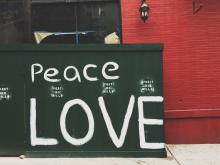
“Blessed are the peace lovers,” for they shall be called righteous — on the right side. They will be known for what they will not do, for being against war, for preferring peace, for not fighting, for staying out of conflicts.
But that is not what Jesus said.
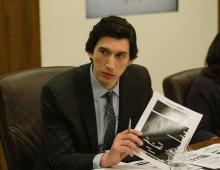
The film juxtaposes the brutality of torture with the reality of its ineffectiveness.
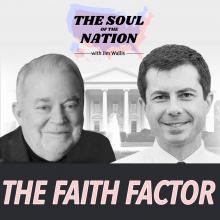
In the third episode of this new season of The Soul of the Nation, the Rev. Jim Wallis interviews Mayor Pete Buttigieg.

Among Christians in the United States, evangelicals are least likely to believe that climate change is real and human caused, according to public opinion polls and academic research. This is not the case in Brazil. There, evangelicals and Pentecostals – who make up about 30 percent of the Brazilian population – are just as environmentally concerned as other religious groups, public opinion surveys show.

One who properly experiences the Amazon and its give-and-take of inter-species compromise, feels a fundamental shift in the world thereafter — the same world which has forced 51 Peruvian species onto the critically endangered list.
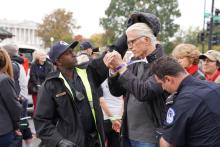
There is no such thing as staying out of politics.
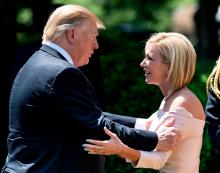
In May 2018, more than a year after taking office, President Donald Trump issued an executive order establishing the position of adviser to his “Faith and Opportunity Initiative.” Last week, more than a year after the issuance of that executive order, and only a year before the next presidential election, the White House confirmed that it has tapped televangelist Paula White to fill this role. In light of these developments, it’s a good time to take a brief look at the history of White House partnerships with faith-based and neighborhood organizations as well as standards that should be used to evaluate such work.

Unfortunately, Romans 13 is often interpreted by those who favor obedience to the status quo as saying that God demands that we always submit to the authorities, because their power comes from God. The most egregious example of this position in recent months is when children were being torn away from their parents at the U.S.-Mexico border, and then-Attorney General Jeff Sessions and then-White House Press Secretary Sarah Huckabee Sanders called family separation “biblical,” citing Romans 13.
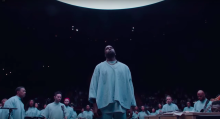
Jesus is King is the most pointed and concise album of Kanye West’s catalogue. He had a clear goal in mind — to praise Jesus for all that he has done for Kanye. Kanye approaches that goal and this album with blinders on, trampling over his hypocrisies of his own life and the way he views the word of God.

Honoring the labor, expertise, and material resources used to make clothes is an essential way to honor God.
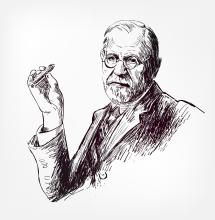
That guilt — whether over the privilege into which he was born, or from a sense of inferiority over never meeting parental expectations, or survivor’s guilt for outliving his brother Fred whose alcoholism led to an early death at 42 — is what I believe has motivated Donald Trump for much of his life.
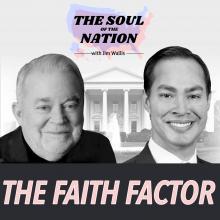
In the second episode of this new season of The Soul of the Nation, the Rev. Jim Wallis interviews Secretary Julian Castro. Throughout this special season, Wallis will sit down with the 2020 presidential candidates to discuss the intersection of faith and politics. The candidates explain how personal faith has shaped their passion for public service and positive social change.

If we want to enact justice in any situation, we must listen to the voices of those directly impacted by the injustice. Those of us who served time on Rikers Island know firsthand why it has to close. Any movement for justice that is not led by directly impacted people is charity, at best, but it is not biblical justice. Biblical justice empowers, while charity can disempower if it is not coupled with justice.

Daniel José Older’s novel is a powerful meditation on love and betrayal in times of revolution.
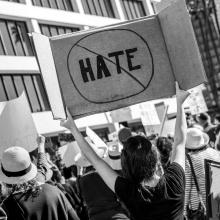
Jesus’ love in action is clearly documented in the New Testament, providing us with a clear script to follow. Unfortunately, his “love-your-neighbor-as-yourself” way of living is contradictory to the cultural norms of craving power and security above all else. To follow Jesus means making — and staying loyal to — an allegiance to the kingdom of God rather than the kingdoms of men.
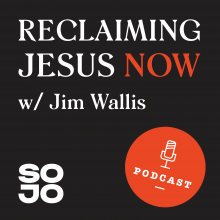
Jim Wallis, in conversation with William Matthews and Allison Trowbridge, explores the themes of Chapter Six, “The Fear Question” from his new book Christ in Crisis: Why We Need to Reclaim Jesus.
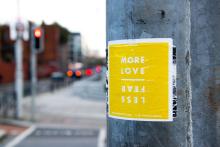
I love what Jesus says over and over again, “Be not afraid,” eight times in the New Testament. When I was a little boy, we were told the story of the disciples in the boat. They’re on the boat and the waves are rocking and rolling, and they’re scared. But then they see Jesus coming, walking on the water, and he says to them, “It is I. Be not afraid.”